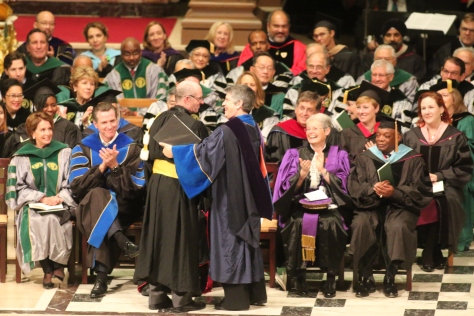Lauren Day
Contributing Writer
The inauguration ceremony on Saturday of Rev. Paul J. Fitzgerald, S.J. wasn’t all formalities. One of Fitzgerald’s oldest friends and one of the ceremony’s distinguished guest speakers, Janet Napolitano, recalled attending college with the newly chosen president. “We even went to prom together,” Napolitano said as the audience erupted in laughter, before adding, “I have pictures.”
With the installation of the University of San Francisco’s 28th president, USF redefined its core values of a comprehensive liberal arts education and a strong affinity for social justice in the Jesuit tradition. A wide array of distinguished guests, current students, faculty and alumni, as well as members of the public, attended to honor Fitzgerald as he was officially sworn in to his position. Leaders who represent USF’s relationships in educational, religious, and governmental realms witnessed and affirmed Fitzgerald’s formal confirmation as university president.

The ceremony focused on Fitzgerald’s “global vision” for the diverse and rapidly changing university. Appropriately, Fitzgerald’s vision for USF focuses on the theme of “unity in diversity,” a trait that USF continues to champion as the eighth most diverse university in the country. Fitzgerald will be ushering in a new era for USF that emphasizes compassionate and reflective social justice.
Among the renowned political guests were U.S. House Minority Leader Nancy Pelosi, who spoke on behalf of the United States House of Representatives, Lieutenant Governor Gavin Newsom, who presented on behalf of the state of California, and Willie Brown, the former San Francisco mayor.
The event also featured religious leaders, such as Sister Geneviève Médevielle, Fitzgerald’s doctoral professor at L’Institut Catholique de Paris, and Bishop McElroy, the auxiliary bishop of the Roman Catholic Archdiocese of San Francisco, in addition to around 50 Jesuits. Médevielle received a warm hug by the newly inducted president after her speech, which revealed what a strict teacher she was, and Fitzgerald’s impressive ability to speak and study in French.
Napolitano, who formerly served as the United States Secretary of Homeland Security, and who is the current president of the University of California system, reintroduced the importance of “unity in diversity.” She spoke about the established relationship between the UC system and USF. She commended both institutions for “stimulating students to think critically with a strong education to provide for the ever-changing future,” while citing statistics on student demographics to draw a parallel between USF and the UC system.
Newsom noted that although recognizing the need for diversity is important, it is engaging in a diverse environment that makes the greatest difference. “What makes our city and nation great is this: we don’t just tolerate diversity, we embrace it,” he said. By embracing diversity, people are exposed to the unfamiliar, encouraged to reevaluate the way they think, and are obligated to critically challenge their beliefs by recognizing others’.
Fitzgerald was then presented the investiture of the president with a gold medallion of office containing the seal of the university. Students Eva Long, ASUSF President, and Alexia Thompson, Graduate Student Senate President, formally offered the medallion to him.
“There was a lot of local, national, [and] international dignitaries,” Long said, alluding to how impressed she was about the high-profile speakers at the event. She also added that “it was a very, very beautiful ceremony,” and how she enjoyed the prayers that were given at the Inaugural Mass in different languages. “It really kind of shed light on how diverse USF is, and how appreciative we are of different cultures.”
Fitzgerald also highlighted that economic diversity is critical in expanding the experiences of students at USF. Approximately 42% of the student body are considered to have come from ‘low-income’ households, and are able to attend USF through generous financial aid. Social justice includes the easier accessibility to education for all.
Fitzgerald plans on focusing his attention on educating students as leaders for the global world. His concentration will lead USF to academically engage with the thriving technological industry in San Francisco, particularly since he intends to develop majors and programs that embrace these new economies. Moreover, Fitzgerald hopes to educate students thus through faith and justice.
In his first official presidential address, Fitzgerald said, “Faculty colleagues of diverse religious traditions and philosophical backgrounds may use diverse vocabularies to describe our shared mission, yet all contribute essentially to a project that engages our students to broaden their horizons, advance their intellectual abilities, and strengthen their confidence and capacity as creative, compassionate and ethical leaders for a global tomorrow,” said Fitzgerald. It was clear that diversity is a big priority.
Kimberlee Parton and Elizabeth Silva contributed to the reporting.

